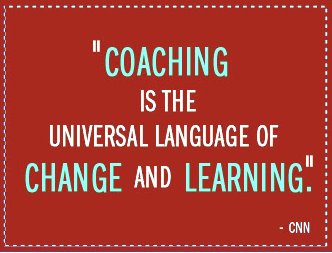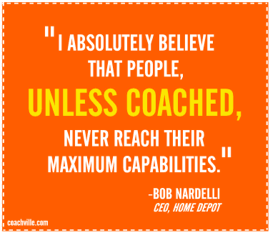In my last post, I discussed the benefits of having a team of mentors backing you up on your journey of personal and professional development. I can certainly attribute much of my growth, resilience and success to the guidance that my mentors have contributed over the years.
In addition to my mentors, I have also started working with a business coach in recent months, which I believe adds another dimension to my learning. So what’s the difference between a mentor and a business coach, since both advise and guide on aspects of career development? Well, coaching and mentoring do use some of the same skills but there are distinct differences.

Difference 1:
Coaching is task oriented.
The focus is on concrete issues, so in my case, we have been looking at how I can develop specific skills that will improve my leadership performance in a high performing sports organisation, to compliment the work I am doing in my Masters in Sport Directorship. This has included strategies to improve industry experience, as well as wider study and reading.
As such this requires a content expert (coach) who is capable of teaching the coachee how to develop these skills and so my coach was recommended to me by the Manchester Metropolitan University School of Business and Law, where I am studying. Coaches are usually trained and certified as coaches and possess strong process management skills.
Mentoring is relationship oriented.
Mentoring seeks to provide a safe environment where the mentoree feels comfortable discussing whatever issues affect their professional and personal success. As such, I reflect on the issues I am needing guidance on and then reach out to the mentor or mentors in my network who I believe are best placed to advise me.
Although we do use specific learning goals or competencies, our focus is wider than just these aspects and includes how my personal attributes or needs may influence my professional performance and decision-making. Interestingly a couple of my mentors are also trained coaches and that does bring a slightly different dimension to our mentorship sessions. Not better, not worse…just different!
“Each person holds so much power within themselves that needs to be let out. Sometimes they just need a little nudge, a little direction, a little support, a little coaching, and the greatest things can happen.”
Pete Carroll, Head Coach, Seattle Seahawks
Difference 2:
Coaching is short term.
A coach can successfully be involved with a coachee for a short period of time, potentially just a few sessions. The coaching lasts for as long as is needed, depending on the purpose of the coaching relationship and in my case I know that as my demands change, there will be a time when I start to work with a new coach.
Mentoring is always long term.
Successful mentoring requires time in which both parties can learn about one another and build a climate of trust that establishes an environment in which the mentoree can feel secure in sharing the real issues that impact his or her success.
Personally, I am lucky to have known all but one of my mentors either personally or professionally for a number of years and in each instance, the trust in the relationship was established before I approached each person to offer support as a mentor.
“That's the beauty of coaching. You get to touch lives, you get to make a difference. You get to do things for people who will never pay you back and they say you never have had a perfect day until you've done something for someone who will never pay you back.”
Morgan Wootten
Difference 3:
Coaching is performance driven. The purpose of coaching is to improve the individual's performance on a specific job or task. This involves either enhancing current skills or acquiring new skills and thus, once the coachee successfully acquires the skills, the coach is no longer needed.
Think of it like working with a technical coach in a sports environment. For example, if a hockey player needs to improve an aspect of his skating, he will work with a skating coach that has been identified as being suitable to provide tuition in that area. Once the skill has been mastered, then the input ceases to be of benefit.
Mentoring is development driven.
Mentoring is designed to develop the individual not only for the current task, but also for future demands.
My mentors know what I am working on in the here and now but have also provided guidance as to how this will help me achieve my future goals and where I need to focus on next to support the experience I am currently building.
“My best investment, as cliched as this sounds, is the money I've spent developing myself, via books, workshops and coaching. Leadership begins within, and to have a better career, start by building a better you.”
Robin S. Sharma
Difference 4:
Coaching does not require design.
Coaching can be conducted almost immediately on any given topic. My initial coaching session involved answering a series of questions to determine my areas of competence, the expertise I was looking to acquire in the present stage of my career, and in some instances, this will also include identifying the correct assessment tools we should use to establish progress in this area. After that was completed, the coaching work began.
Mentoring requires a design phase.
In order to determine the strategic purpose for mentoring, the focus areas of the relationship, the specific mentoring models, and the specific components that will guide the relationship, a certain degree of planning is required.
Given my existing relationships with each of my mentors, most of this work had been done informally as both parties understood what was needed and what each mentor was able and prepared to offer.
“Constant, gentle pressure is my preferred technique for leadership, guidance, and coaching.”
Danny Meyer
Considering the above differences, I would recommend seeking out a business coach if you are looking to develop a specific skill to enhance your ability to do a job you have been tasked with in your work. This maybe because the responsibilities of your role have changed, you have been promoted to a role that requires new skills or because you are struggling to perform in an area in your current role.
“Selecting the right person for the right job is the largest part of coaching.”
Phil Crosby
Identifying your limitations and shortfalls is a sign of strength. Furthermore, by researching, seeking out and engaging with a coach demonstrates that you are pro-active, have a growth mindset and hold yourself accountable for the work you do.
So if a business coach can help improve your performance at work, surely a life coach can help develop aspects of your performance in other areas of your life?
Speaking from personal experience, a few months ago, I realised there were aspects of my life that I need to pay more attention to. I had allowed myself to focus more on work than on my other relationships, had drifted from some of my core values and needed to address my priorities. After some honest soul searching and reflection, I decided I needed someone to help me review my philosophies, develop different perspectives in various areas of my life and understand what was influencing my behaviour in relationships under certain circumstances.
“Coaching helps you take stock of where you are now in all aspects of your life, and how that compares to where you would like to be.”
Elaine MacDonald
The next blog post will explore the benefits of having a life coach and what exactly that relationship involves.


